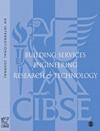不同几何形状的新型露点蒸发冷却器热交换器设计的评价
IF 1.8
4区 工程技术
Q3 CONSTRUCTION & BUILDING TECHNOLOGY
Building Services Engineering Research & Technology
Pub Date : 2023-05-30
DOI:10.1177/01436244231179456
引用次数: 1
摘要
在本研究中,研究了四种用于露点蒸发冷却的新型热质交换器,并将其性能与常用的平板和波纹板交换器进行了比较。在所提出的换热器中,每个干通道被其相邻的湿通道完全封闭,每个湿通道被其邻近的干通道完全封闭(相关详细信息如本文所示)。此外,还建立了一个稳健的数值模型,并在各种操作和几何条件下进行了检验。分析表明,所提出的露点蒸发冷却器提高了冷冻空气的温度、耗水量、冷却能力和能源效率。特别是,圆形同心管换热器在某些操作条件下(入口空气温度、湿度比和速度分别为40°C、6 g/kg和3 m/s),可产生9.6°C的最低冷冻空气温度和148%和99%的最高湿球和露点效率。此外,对于1m/s的入口空气速度,耗水量降低到1.34L/hr。三角管换热器的冷却能力和性能系数最高,但耗水量最大。我们的几何分析表明,通过采用新的热交换器和质量交换器通道几何形状,可以提高露点蒸发冷却系统的整体性能。实际应用:露点蒸发冷却器是一种用于建筑的环保型空调系统。它被认为是取代蒸汽压缩制冷系统的最有力的候选者,因为它在实现高性能的同时消耗的电力要少得多。我们的研究表明,通过修改几何形状,可以进一步提高系统的性能,从而提高能源和水的效率。本文章由计算机程序翻译,如有差异,请以英文原文为准。
Evaluation of new dew point evaporative cooler heat and mass exchanger designs with different geometries
In this study four new geometries of heat and mass exchanger for dew point evaporative cooling are investigated and their performance is compared to that of the commonly used flat plate and corrugated plate exchangers. In the proposed exchangers, each dry channel is completely enclosed by its adjacent wet channels, and each wet channel is completely enclosed by its adjacent dry channels (related detailed information is presented graphically in this paper). In addition, a robust numerical model was developed and is examined under various operational and geometrical conditions. The analysis showed that the proposed dew point evaporative coolers improve the chilled air temperature, water consumption, cooling capacity, and energy efficiency. In particular, the circular concentric tube exchanger, under certain operating conditions (inlet air temperature, humidity ratio, and velocity of 40°C, 6 g/kg, and 3 m/s, respectively), could produce the lowest chilled air temperature of 9.6°C and the highest wet bulb and dew point effectiveness of 148% and 99%, respectively. Additionally, water consumption is reduced to 1.34 L/hr for an inlet air velocity of 1 m/s. A triangular tube exchanger achieved the highest cooling capacity and coefficient of performance, but consumed the largest amount of water. Our geometrical analysis demonstrates that the overall performance of dew point evaporative cooling systems can be improved by employing new geometries for heat and mass exchanger channels. Practical application: The dew point evaporative cooler is an environmentally friendly air conditioning system used in buildings. It is considered the strongest candidate to replace vapour-compression refrigeration systems because it consumes considerably less electricity while achieving high performance. Our research demonstrates that through revised geometry it is possible to further improve the performance of the system leading to improved energy and water efficiency.
求助全文
通过发布文献求助,成功后即可免费获取论文全文。
去求助
来源期刊

Building Services Engineering Research & Technology
工程技术-结构与建筑技术
CiteScore
4.30
自引率
5.90%
发文量
38
审稿时长
>12 weeks
期刊介绍:
Building Services Engineering Research & Technology is one of the foremost, international peer reviewed journals that publishes the highest quality original research relevant to today’s Built Environment. Published in conjunction with CIBSE, this impressive journal reports on the latest research providing you with an invaluable guide to recent developments in the field.
 求助内容:
求助内容: 应助结果提醒方式:
应助结果提醒方式:


